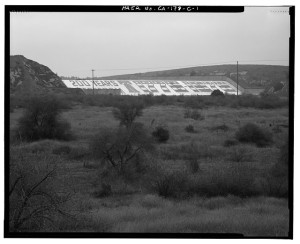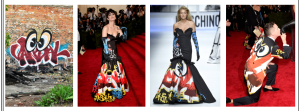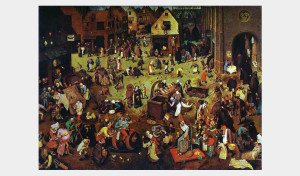Last week the Art Law Committee of the New York City Bar Association hosted a terrific two-hour event. Entitled “Rethinking Art Authentication,” the discussion aimed to address a way forward from the problems of fakes, forgeries, and authentication lawsuits that have plagued the art market in recent years. It was a lively and fascinating evening.
Nicholas O'Donnell

Recent Posts
Recap of “Rethinking Art Authentication” at the New York City Bar
Topics: Karl Waldmann, Ceroni, Jacobs Technion-Cornell Institute, Leonardo da Vinci, Cady Noland, Knoedler, New York Assembly, Catalogue raisonée, authentication, Dean R. Nicyper, New York University, Colette Loll, Blue Room, Dan Flavin, Dada, Visual Artists Rights Act, Rick Johnson, Rethinking Art Authentication, The Work of Art in the Age of Mechanical Reproduct, Jennifer L. Mass, Art Law Committee, Trial Lawyers Association, Beltracchi, Events, La Bella Principessa, Hyperspectral imaging, Gerhard Richter, New York City Bar Association, Cornell Tech, Rijksmuseum, Cowboys Milking, Andy Warhol, Picasso, New York Senate, Walter Benjamin, Elmyr de Hory, Withers Bergman LLP, Amadeo Modigliani, Amy M. Adler
UPDATED—Rethinking Art Authentication—December 2, 2015 at the NY City Bar Association
Registration is now available for an upcoming event about which we posted previously: The Art Law Committee of the New York City Bar Association’s “Rethinking Art Authentication” on December 2, 2015 at the City Bar's headquarters at 42 West 44th Street (between 5th and 6th Avenues).
Topics: Jacobs Technion-Cornell Institute, Dean R. Nicyper, New York University, Colette Loll, Rick Johnson, Jennifer L. Mass, Art Law Committee, Events, New York City Bar Association, Cornell Tech, Rijksmuseum, Withers Bergman LLP, Amy M. Adler
Widespread Criticism Continues from Historians Over Germany’s and SPK’s Revisionism Concerning Holocaust and Forced Sales of Art
We reported last week on the outrage over the decision by Germany and the Stiftung Preussischer Kulturbesitz (SPK) to argue in their motion to dismiss my clients’ claims to the Welfenschatz that a commercial interaction between German Jews and a cabal instigated by Hermann Goering in 1935 “predated the Holocaust by several years.” As we noted last week, the suggestion that the Holocaust was a distant possibility in 1935 was an indefensible statement, factually, historically, and ethically. The initial reaction was swift and severe. As Germany gets ready to host the First Conference of the German Centre for Cultural Property Losses next week, its policies are hurtling in the wrong direction.
Topics: Jewish Week Mel Urbach, Hermann Goering First Conference of the German Cen, Gesetz zur Wiederherstellung des Berufsbeamtentums, Henning Kahmann, Atlanta, Simon Wiesenthal Center, Varda Neumann Federal Administrative Court, Yale University, Marion Kaplan, New York University, Germany, Nazi-looted art, Hitler, Kristallnacht Rabbi Abraham Cooper, Deborah Lipstadt, U.S. Holocaust Memorial Museum, Markus Stoetzel, Emory University, Behrens, Holocaust, Bloodlands, SPK, Advisory Commission, Black Earth: The Holocaust as History and Warning, Stiftung Preussischer Kulturbesitz, Restitution, Los Angeles, World War II, Law for the Restoration of the Professional Civil, Washington, Raubkunst, Timothy Snyder, Welfenschatz
Rethinking Art Authentication—December 2, 2015 at the New York City Bar Association
The Art Law Committee (of which I am a member) of the New York City Bar Association is holding a fascinating evening event on December 2, 2015 at the City Bar's headquarters at 42 West 44th Street (between 5th and 6th Avenues). Entitled “Rethinking Art Authentication,” the program will address issues that readers here will find familiar and yet challenging: the ongoing struggle against fakes and forgeries in the art market. From the flyer:
Topics: Jacobs Technion-Cornell Institute, authentication, Dean R. Nicyper, New York University, Colette Loll, Rick Johnson, Jennifer L. Mass, Art Law Committee, Events, New York City Bar Association, Cornell Tech, Rijksmuseum, Withers Bergman LLP, Amy M. Adler
Leonard Peltier and Public Displays of Art—The Government Taking Sides on Whose Paintings are Shown Stirs Up First Amendment Problems
An exhibition in Washington (state) that included art by a number of Native Americans, including Leonard Peltier, has provoked an outcry that may have Constitutional dimensions that went unconsidered. Peltier is a controversial Native American activist who was convicted of murdering in 1975 two FBI agents, Jack R. Coler and Ronald A. Williams. His conviction has long been a Rorschach Test for responses to Native American activism and the federal government’s response—Peltier has strenuously insisted he is innocent, and the FBI has adamantly maintained he was properly convicted. This has now raised its head in the realm of the public display of art, and whether the government may, or should discriminate among artists. After an outcry about the inclusion of Peltier’s art by a number of current and retired law enforcement officials, the Washington Department of Labor and Industries has announced that it will remove Peltier’s paintings from the display that marked Native American Indian Heritage Month there, and has apologized. Yet regardless of one’s opinion if Peltier’s guilt or innocence, the government has stepped in a First Amendment quagmire when it made a public forum available for expression and then removed the expressive work of only one person because of who he is. The First Amendment, after all, acts to protect expression regardless of popularity, indeed, particularly so. It is hard to argue that his work was removed for any of the reasons that courts generally permit restrictions on speech in the various kinds of public forums. It remains to be seen whether Peltier will object on those grounds.
Topics: Ray Lauer, Wounded Knee, Ronald A. Williams, North Dakota, Florida, South Dakota, American Indian Movement, Native American Indian Heritage Month, Pine Ridge Reservation, Native American, Coleman Federal Correctional Facility Coleman, National Retired Agents Association, Washington Department of Labor and Industries, First Amendment, Guardians of the Oglala Nation. GOON, Jack R. Coler, AIM, Leonard Peltier, Lakota Sioux Chippewa
Despite Universal Criticism, German Cabinet Approves Stricter Cultural Heritage Law
The German federal cabinet has approved a revision to its cultural heritage protection law notwithstanding overwhelming opposition by essentially everyone who commented, putting the draft on the fast track to legislative enactment next year.
Topics: cultural property, VAT, Georg Baselitz, Germany, Minister of Culture Monika Grütters, EU, Artforum, Kulturgutschutzgesetz, Gerhard Richter, cultural heritage protection law, Michael Werner, Welfenschatz
New VARA Ruling Muddies Analysis on Moral Rights and Significance of “Site Specific” Art
A recent injunction ruling that prohibited the destruction of the “Bicentennial Freedom Mural” in Corona, California had occasion to consider the rights asserted by the plaintiffs and artists under the Visual Artists Rights Act of 1990 (VARA), 17 U.S.C. § 106A. The order ultimately granted the injunction but on different grounds, holding that the plaintiffs were unlikely to prevail on their VARA claim.
Topics: work of recognized stature, Mural Conservancy of Los Angeles, 555 U.S. 7, Moral Rights, United States Army Corps of Engineers, Cal. Civ. Code §§ 987 and 989, Inc., Visual Artists Rights Act of 1990, California, Santa Ana River Mainstem Project, Pippa Loengard, 54 U.S.C. § 306108, VARA, Kernochan Center for Law Media and the Arts, Corona, Ronald Kammeyer, Columbia Law School, Phillips v. Pembroke Real Estate, Copyright, Prado Dam, NHPA, Administrative Procedure Act, National Historic Preservation Act, 17 U.S.C. § 106A(a)(3)(A)-(B), 459 F.3d 128, 5 U.S.C. §§ 701-706, Winter v. Natural Res. Def. Council, SARM
Holocaust Revisionism in German Motion to Dismiss Guelph Claim Elicits Condemnation
Germany Runs Counter to 20 Years of International Commitments
As readers know, my clients Alan Philipp and Gerald Stiebel sued the Federal Republic of Germany and the Stiftung Preussischer Kulturbesitz (SPK) in February for restitution of the Guelph Treasure (or Welfenschatz as it is known in Germany), assisted by my co-counsel Mel Urbach, Esq. and Markus Stötzel of Marburg, Germany. As my co-counsel speak to an event tonight hosted by Congresswoman Grace Meng on the anniversary of Kristallnacht, an event inextricable to the persecution of Jews in Europe, Germany’s response to the Complaint advances a stunning revisionism about the Holocaust and the international commitments that Germany has made. While paying lip service to the seriousness of Jewish suffering, the papers filed in court are nothing less than an attempt to move the goalposts to exempt a historical period from responsibility about which there can be no serious debate. Independent condemnation was not far behind the filing.
Topics: Grace Meng, Simon Wiesenthal Center, Shoah, Adolph von Menzel, Hans Sachs, Washington Principles on Nazi-Looted Art, 1943 London Inter-Allied Declaration, Dachau, Holocaust, Mel Urbach, SPK, George Eduard Behrens, Nuremberg race laws, Holocaust revisionism, Stiftung Preussischer Kulturbesitz, Marburg, Restitution, Los Angeles, Gerald Stiebel, World War II, Markus Stötzel, Saemy Rosenberg, Deutsches Historisches Museum, Reichskristallnacht, Isaac Rosenbaum, Lucie Ruth Hackenbroch, Federal Republic of Germany, Zacharias Hackenbroch, Pariser Wochentag, Rabbi Abraham Cooper, Paris Weekday, Alan Philipp, Welfenschatz, Military Government Law 59, Frankfurt
Graffiti on the Runway: Street Artist Rime Pursues Lawsuit Against Moschino for Damaging His Street Cred
The fusion of street art, high fashion, and the law is hardly new, but the Italian designer Moschino’s latest foray into this genre has landed the company in court. Joseph Tierney, a well known graffiti artist who works under the pseudonym “Rime”, filed a complaint against Moschino and its creative director, Jeremy Scott, alleging copyright infringement, trademark violations under the Lanham Act, and unfair competition, and appropriation of name and likeness under California law. Moschino’s allegedly unauthorized use of his work has harmed the artist in numerous ways, Tierney alleges, not the least by opening him up to accusations of selling out. In the words of Tierney’s complaint: “nothing is more antithetical to the outsider ‘street cred’ that is essential to graffiti artists than association with European chic, luxury and glamour – of which Moschino is the epitome.” This theory of harm was something we talked about at the "Copyrights on the Street" panel at the Copyright Society of the USA meeting in Newport this year, and it is now being put to the test.
Topics: Joseph Tierney, copyright management information, Vandal Eyes, Digital Millennium Copyright Act, Rime, The Wall Street Journal, Graffiti Art, 17 U.S.C. § 1202, Gigi Hadid, Hollywood Reporter, Jeremy Scott, Copyright, Moschino, Lanham Act, The New York Times
Bruegel Painting In Vienna Spurs Argument Over Allegations of Nazi Looting in Poland
Most often in restitution battles the disagreement boils down to whether a painting was looted, and/or whether it changed hands under circumstances that failed to pass clear title to the predecessor of its current possessor. Then, controversy frequently ensues about the extent to which the possessor resists restitution on grounds other than the title of the painting (jurisdiction, statute of limitations, etc.). Rarer is the type of dispute where the parties don’t even agree about what they’re disagreeing about, like the one brewing between Austria and Poland over a painting by Pieter Bruegel the Elder that hangs in the Kunsthistorisches Museum (KHM) in Vienna, The Fight Between Carnival and Lent (1559).
Topics: Musée des Beaux Arts, Brussels, Krakow, Nazi-looted art, Diana Blonska, Gauleiter, Otto Gustav von Wächter, Feliks Kopera, Charlotte Wächter (née Bleckmann), Restitution, Kampf gegen Fasching und Fasten, Frau Wächter, Pieter Bruegel the Elder, Kunsthistorisches Museum, Poland, Austria, Museums, Vienna, The Battle Between Carnival and Lent








